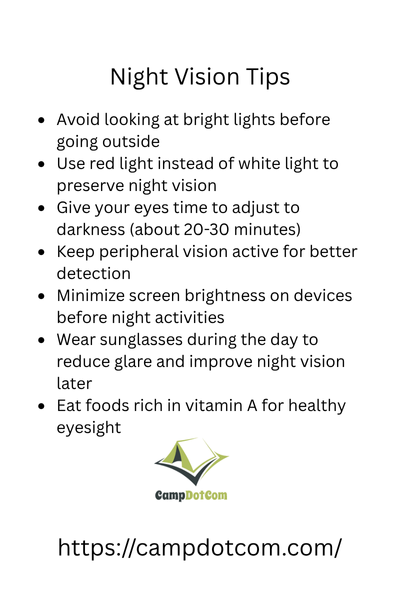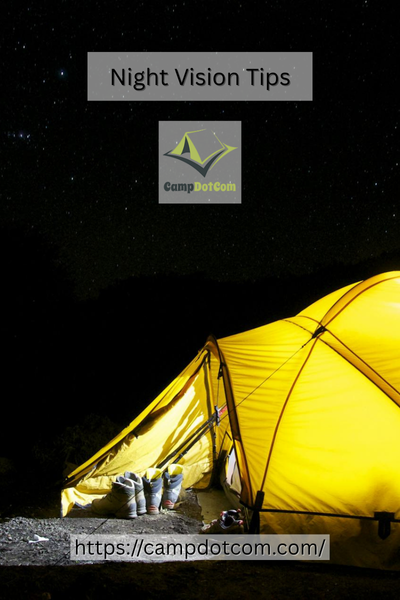Let’s talk about night vision tips, because if you’ve ever stumbled through a dark campsite or squinted your way down a dim trail, you know how tricky low-light situations can be. I’ve been there—tripping over rocks, fumbling with gear, feeling like a clumsy bat. Not fun. But here’s the good news: you don’t have to be part owl to see better at night.
Read More About Night Vision Tips

Why You’re Probably Struggling With Night Vision
First off, it’s not just you. Our eyes are naturally built for daylight. At night, your pupils dilate to suck in as much light as possible, but if you’ve been staring at your phone or car lights beforehand, your eyes won’t adjust properly. That’s why one of my first night vision tips is to give your eyes a little break from artificial light before heading out.
When I was prepping for my first solo overnight hike, I made the rookie mistake of watching Netflix on my phone right up until I zipped up my tent. Rookie move. I spent the next 30 minutes blinking into the dark like a confused raccoon. Lesson learned.
As an Amazon Associate, I earn from qualifying purchases. Some of the links in this article are affiliate links. This means that, at zero cost to you, I will earn an affiliate commission if you click through the link and finalize a purchase.
Get Your Eyes Night-Ready
One thing that works like a charm? Letting your eyes adjust to darkness naturally. It takes about 20 to 30 minutes, so if you know you’ll be in a low-light situation, give your eyes time to adapt. Turn off bright lights, avoid your phone, and just sit in the dark. It’s kind of relaxing, actually—like a forced tech detox.
More Things to Know About Night Vision Tips
Wearing red-tinted glasses beforehand can help too. Red light doesn’t mess with your night vision the way white or blue light does. I got a cheap pair on Amazon, and now I look like a sci-fi villain when I’m prepping for stargazing. Totally worth it.

Smart Gear Choices Make a Big Difference
You don’t need military-grade equipment, but some smart gear goes a long way. My headlamp has both white and red light modes, which means I can switch to red when I need to preserve my vision. Flashlights are fine, but headlamps keep your hands free—essential if you’re carrying gear or holding snacks.
Speaking of gear, try to avoid shining bright lights directly in your or anyone else’s eyes. It resets your night vision like flipping off a light switch. Trust me, nothing earns you side-eye from fellow campers like blinding them during a midnight bathroom run.
Fuel Your Eyes From the Inside
Believe it or not, your diet plays a role in night vision. Foods rich in vitamin A, like carrots, sweet potatoes, and spinach, help your eyes perform better in low light. Now, I’m not saying carrots will turn you into a nocturnal superhero, but they’re definitely part of the puzzle.
I’ve gotten into the habit of tossing some dried mango or carrot sticks in my trail mix. Easy, tasty, and gives me a bit of a boost for those twilight hours.
Practice Makes Better
This might sound odd, but practice seeing in the dark. When you’re home, try navigating a familiar space with the lights off—safely, of course. You’ll start to notice how your eyes adjust and pick up subtle shapes and shadows. It’s kind of fun, like a real-life stealth game.
And hey, if your pet stares at you like you’ve lost your mind, you’re probably doing it right.
Keep Your Eyes Moist and Healthy
Dry eyes can lead to poor night vision. If your eyes are dry or irritated, they’re not going to perform well in low light. I always keep eye drops in my pack just in case.
Also, blink often—especially if you’re out in the wind or cold. It’s one of those tiny habits that makes a noticeable difference.
Avoid Common Mistakes
One important tip is to avoid moving quickly from bright to dark environments. If you go from your car headlights straight into the woods, your eyes will not stand a chance.
Gradually dimming the lights or using that red light feature we talked about earlier helps tons.
Also, alcohol messes with your ability to see clearly at night (among other things). So save the celebration drink for after you’re done navigating the dark.
Making the Most of Your Night Vision Tips in Real Life
Night vision isn’t just for military pros or extreme adventurers—it’s something regular folks like you and me can totally improve with just a few tweaks. Whether you’re walking the dog late at night, camping under the stars, or navigating a dark house during a power outage, these night vision tips will make your life easier.
I still remember the first time I got it right. Walking confidently along a moonlit trail, spotting little animals in the brush, and feeling completely in tune with the night. No stumbles, no stress. Just me, the stars, and the path ahead.
You’ve got this too. Start with one tip and build from there. Who knows? Maybe night will become your favorite time of day.
Stay Sharp With These Night Vision Tips
Improving your night vision isn’t about fancy gear or superhuman skills. It’s about giving your eyes what they need, being smart with your light sources, and making a few small changes that pay off big time.
So next time you’re heading into the dark, remember: you’ve got the knowledge, the gear, and the confidence. And if not, come back to these night vision tips—I’ll be here, probably tripping over a root and laughing about it.
